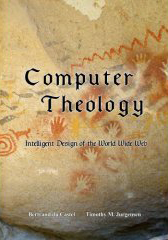PRESS
 |
COMPUTER THEOLOGY |
||||
|
familial connections. The dominant
forms of these larger grouping mechanisms have long been grounded in religion. Religion,
theology and policy are three concepts that are intertwined and together
provide the focus of the collectives that form much of the basis of human
evolutionary success. These collectives derived initially from the basic family
unit and evolved into ever increasing ensembles of individuals, culminating in
religious congregations that have been foundational in their provision of
social structure that has been so essential in the ascent of mankind. We use the
term religion to identify a system of
beliefs generally shared by its adherents, including the basis in trust for
that sharing. Theology in turn refers
to the specific framework for those beliefs including how they are to be
applied and the potential consequences of that application. Finally, we evoke
the realm of policy in specific
regards to the beliefs themselves, essentially defining for the individual
those actions selected from among various choices whose objectives are both the
furtherance of the religion on which are based the actions and the benefits to
the individual suppliants of the religion. Religions are
grounded in the facilities of the human mind. They draw their strength from
emotions and their behaviors from cognitive processes. By exploiting these
physiological characteristics, religion provides the framework for commonly
held belief systems through which the actions of groups of people are focused
and directed. Through the affirmation of moral and ethical values that are
shared by the group, codes of conduct that guide the behavior of individuals
within the group can be defined. These moral and ethical values posit a
justification for actions aimed at the well being of the many, even at the
expense of sacrifice on the part of the one. Thus is formed a basis for
personal altruistic behavior; a behavior that is often asymmetric in its
application and effect. Consider for example the soldier who throws himself
upon the grenade thereby accepting certain death for himself in return for the
possibility of saving his comrades. In a like manner, the mother in a poor and
starving family might forego food for herself thereby accepting the ravages of
continuing hunger in order to provide a little more sustenance for her
children. Closer to religion, a similar stimulus drives a pilot to crash his
aircraft into a ship of war or a building of commerce to placate his perceived
responsibility to the prevailing social order. These are all illustrative of a
policy system grounded in profound trust that evokes an action presumably beneficial
to others at the expense of self as being the preferred response to threats of
a given type. While such acts are not the exclusive domain of religion, we
suggest that altruism is a characteristic of a general model of social
organization for which religion is an iconic example. Acts of altruism or of
its harsher sibling, sacrifice, are harbingers of uncertainty within the
biological concepts of evolution and natural selection. Indeed, altruistic
behavior is generally viewed as counter intuitive from the perspective of
natural selection. It is, however, an undeniable, recurring theme of social
organization, and it is through social organization that mankind achieves its
evolutionary eminence. We can readily discern through its repetitive occurrence over the ages that religion provides its groups of believers with sets of common values. Further, we can also observe that the stimulation of actions based on such values is the central aspect of the concept of policy. To fully understand this connection between values and actions, it is necessary to consider the complete environment within which policy is defined and implemented; an environment we term a trust and policy infrastructure. The establishment of effective policy infrastructures elevates the trust infrastructures of religion and religious systems to the forefront of human social order. Religion is not a mere perturbation of the human cognitive system; it is a natural product of that system. The long ages of natural selection have wrought theologically guided religious practice just as they’ve culminated in the opposing thumb. Within the implementations of distinct religions are found the |
||||
|
||||
© Midori Press, LLC, 2008. All rights reserved for all countries. (Inquiries) The contents of ComputerTheology: Intelligent Design of the World Wide Web are presented for the sole purpose of on-line reading to allow the reader to determine whether to purchase the book. Reproduction and other derivative works are expressly forbidden without the written consent of Midori Press. Legal deposit with the US Library of Congress 1-33735636, 2007.
|
ComputerTheology Intelligent Design of the World Wide Web Bertrand du Castel and Timothy M. Jurgensen Midori Press, Austin Texas 1st Edition 2008 (468 pp) ISBN 0-9801821-1-5 |
Book available at Midori Press (regular) |